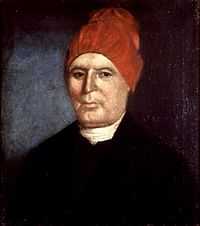Samuel Hopkins (1721–1803)

Samuel Hopkins (September 17, 1721 – December 20, 1803) was an American Congregationalist, theologian of the late colonial era of the United States, and from whom the Hopkinsian theology takes its name.
Early life
Samuel Hopkins (the younger) was born in Waterbury, Connecticut,[1] and was named after his uncle, Samuel Hopkins (1693–1755), a minister in the church in West Springfield, Massachusetts.[citation needed] Hopkins graduated from Yale College in 1741, then studied divinity in Northampton, Massachusetts with Jonathan Edwards. He was licensed to preach in 1742, and in December 1743 was ordained pastor of the North Parish of Sheffield (now Great Barrington) in Housatonic, Massachusetts, a small settlement of only 30 families, from 1743 to 1769. Hopkins' theological views were faced with opposition and he was eventually dismissed from the pastorate due to a lack of funds for his support. From April 1770 until his death in 1803 Hopkins preached at the First Congregational Church in Newport, Rhode Island While the British occupied Newport from 1776–1780, Hopkins preached at Newburyport, Massachusetts, and Canterbury and Stamford, Connecticut.[1] [2]
Hopkins received a Doctor of Divinity from Yale in 1802.
Theological Contributions
He, Jonathan Edwards and Joseph Bellamy together created, perhaps unintentionally, the theological scheme that sometimes bears Hopkins name, i.e. Hopkinsianism, but is also known as the New Divinity, New School Theology, New England Theology or Edwardseanism. This religious system is a form of Calvinism which later adherents called "consistent Calvinism." The view evolved into a distinct theology which dominated theological thinking in New England, which was predominately Calvinist. The whole theological movement was important in the Second Great Awakening. It was opposed generally by the theologians of Princeton, including Charles Hodge. Hopkins is credited with originating the phrase "disinterested benevolence", though the concept is much older and can, for example, be seen in Jonathan Edwards ethical writings as well.
Originally a slaveholder, Hopkins was one of the first of the Congregationalist ministers to denounce slavery. His efforts coincided with the 1774 law that forbade the importation of slaves into Rhode Island, and the 1784 law that granted freedom to all slaves born in Rhode Island after March 1785. During the American War of Independence, Hopkins' school for negro missionaries to Africa was broken up due to the confusion.[1]
Harriet Beecher Stowe even admired Hopkins enough to portray him as one of the protagonists of her third novel The Minister's Wooing.
Abolitionist Advocacy
An early opponent to the institution of slavery, he published a pamphlet entitled, "A Dialogue Concerning the Slavery of the Africans",[1] which was addressed "To the Honorable Members of the Continental Congress, Representatives of the Thirteen United American Colonies".
Publications
His publications include:[1]
- A Dialogue concerning the Slavery of the Africans, showing it to be the Duty and Interest of the American States to emancipate all their African Slaves (1776)
- A Discourse upon the Slave Trade and the History of the Africans (1793)
- A System of Doctrines Contained in Divine Revelation, Explained and Defended (1793)
- Life and Character of Jonathan Edwards (1799)
Notes
References
- Attribution
 This article incorporates text from a publication now in the public domain: Walker, Williston (1911). "Hopkins, Samual". In Chisholm, Hugh. Encyclopædia Britannica 13 (11th ed.). Cambridge University Press. p. 685
This article incorporates text from a publication now in the public domain: Walker, Williston (1911). "Hopkins, Samual". In Chisholm, Hugh. Encyclopædia Britannica 13 (11th ed.). Cambridge University Press. p. 685
Further reading
- Hopkins, Samuel (1852), The works of Samuel Hopkins 1, Edwards Amasa Park, Sewall Harding, Doctrinal Tract and Book Society
- Patten, William (1843), Reminiscences of the late Rev. Samuel Hopkins, D.D., of Newport, R.I. Illustrated in His Character and Doctrines, Providence: R.I.
 Wilson, James Grant; Fiske, John, eds. (1892). "Hopkins, Samuel (theologian)". Appletons' Cyclopædia of American Biography. New York: D. Appleton
Wilson, James Grant; Fiske, John, eds. (1892). "Hopkins, Samuel (theologian)". Appletons' Cyclopædia of American Biography. New York: D. Appleton
|